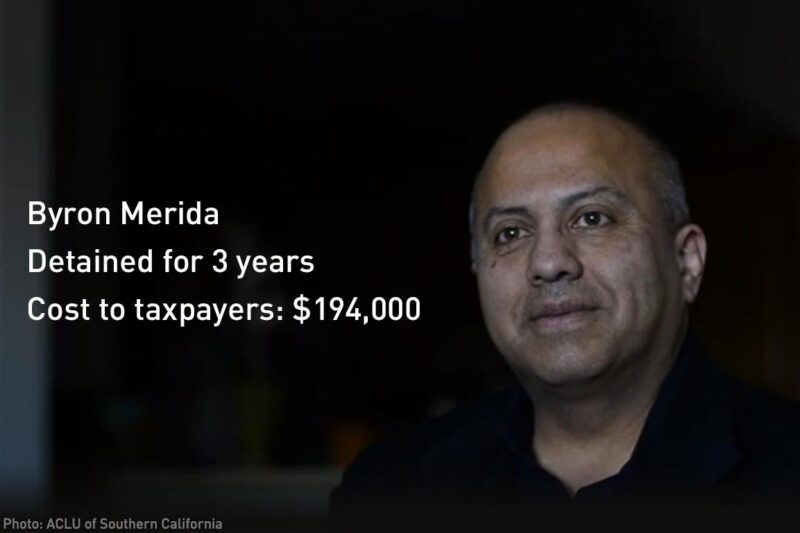Scholars Evaluate the Cost of Locking Up Immigrants For Months and Years on End. The Results Are as Bad as You'd Expect.


In 2012, the government put a record-breaking 478,000 people behind bars while seeking to deport them from the United States.
Many of them are seeking refuge from persecution; others are long-time lawful permanent residents with U.S. citizen family. And people who eventually win their immigration cases are perversely the ones most likely to languish in prison for months or years on end while their cases drag on through the system.
So what are the costs of locking up immigrants for months or years on end who pose absolutely no threat to the community?
This week, 46 scholars of sociology, criminology, anthropology, psychology, geography, public health, medicine, Latin American studies, and law provided some grim answers. The group filed a friend-of-the-court brief in Rodriguez v. Robbins, a class action lawsuit brought by the ACLU to ensure that no one is subject to indefinite immigration detention without due process of law.
The brief details the effects of long-term detention on American families and communities. The findings aren't good:
- Long-term detention jeopardizes immigrants' health and safety. Immigrants subjected to prolonged detention suffer substandard medical and mental health care, inadequate recreation, severely limited visitation, solitary confinement, and increased risk of physical and sexual assault.
- Long-term detention imposes economic hardship on American families. Many immigrants are the sole or primary breadwinners in their families. When they're detained for months on end, they invariably lose their jobs and ability to pay for food and shelter for their families. Some are forced to foreclose on their homes.
- Long-term detention hurts children, many of whom are U.S. citizens. Sixty-three percent of clients in the Rodriguez case have a U.S. citizen child. Children whose parents are detained suffer increased anxiety, stress, depression, anger and withdrawal; changes in sleeping habits; and harms to their development and academic performance.
- Long-term detention is a waste of taxpayer dollars. The Obama administration's most recent budget proposal requested $1.8 billion to fund detention, at a daily cost of $161 per detainee. The average daily cost per participant for programs that supervise people without throwing them in prison was $5.94. And along with being cheaper, such programs are highly successful. Under the government's full-service program, 96 percent of participants showed up for court in 2011.
One takeaway is that if the government is going to put people in jail for months and years, it better have a good reason for doing so. The government can do that by ensuring that everyone receives the basic due process of a hearing before a judge to determine if their detention is justified.
Last year, the U.S. Court of Appeals for the Ninth Circuit ordered the government to provide such hearings after six months of detention. More than 1,250 hearings were held from November 2012 to January 2014 in the Los Angeles area alone. And in 69 percent of cases, a judge – having finally looked at the person's circumstances – found that the person could be safely returned to the community.
But in the face of the evidence – and despite its professed commitment to Latino and immigrant communities – the Obama administration has appealed the Ninth Circuit's ruling and is fighting to ensure that many immigrants never get the chance to ask a judge to release them. Taking a stand against due process and the welfare of families and communities makes no sense. Instead of resisting the Ninth Circuit's ruling, the administration should expand it nationwide. No one should be put in long-term detention without a hearing to determine if they need to be locked up in the first place.
The costs are too much for all of us to bear.
Learn more about immigrant detention and other civil liberties issues: Sign up for breaking news alerts, follow us on Twitter, and like us on Facebook.

